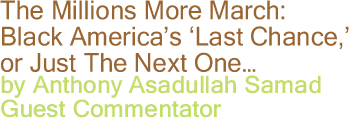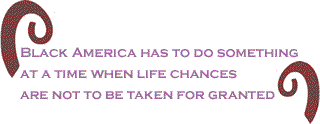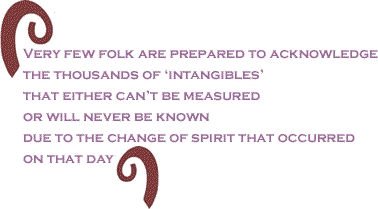
|
|||||||||||||||||||||
|
|
On Saturday, Minister Louis Farrakhan will attempt to replicate the modern day miracle of ten years ago, by convening millions in Washington, D.C. to celebrate the tenth anniversary of the Million Man March. Known as the Millions More Movement, this will be open to all races, men, women, gays, lesbians, transgender and bi-sexuals of good will, as well as labor, the NAACP and the National Baptist Convention (none of whom endorsed the 1995 Million Man March) and all people who face oppression and depression in today’s class conflicted society. Ten years after what many doubted could happen, and what others couldn’t believe had happened, and what others still wonder why it happened, many are asking the question: why should it happen again? The more cynical in our society are suggesting that “black protest” marches are all played out, and that this march is Black America’s last chance to do something great to change the debilitating state of Blacks in the United States. Conversely, the more optimistic in our society think it’s Black America’s next chance to make a difference for the future generations. Either way, Black America has to do something at a time when life chances are not to be taken for granted. The world is watching. But it’s not the first time cynics have raised the proverbial questions, “why” and “what for?”
Some political analysts, social critics, and other opinion leaders have tried to determine what were the social and political benefits to Blacks after the Million Man March. Many others have called the Million Man March a lost opportunity to mobilize a national base, to start a third major political party, while others just cite the fact that there was no tangible or “quantifiable” result that came out of the march. They cite the 1964 and 1965 Civil Rights and Voting Rights Acts after the 1963 March, and the desegregation of the federal government at the threat of the 1943 March on Washington. The absence of national policy gains was the most noted criticism, but there were thousands, if not millions, of young men that stopped their abusive behaviors toward themselves and toward their women. There was the adoption of thousands of orphaned children, which could be tracked. But that didn’t stop the criticism. Then there was the one million men (and over the past ten years, despite every effort to manipulate the count, most historical accounts now acknowledge that there were a million or more men in Washington that day) waving dollar bills that promised a renewed economic initiative to rebuild urban communities. While it didn’t quite work out that way, there were economic development gains, as hundreds of communities saw new business upstarts that came out of the spirit of the Million Man March. But very few folk are prepared to acknowledge the thousands of “intangibles” that either can’t be measured or will never be known due to the change of spirit that occurred on that day – a feeling that most who attended say they have never felt before (or since) – the residual effects that were carried back to communities, families, relationships that offered more hope than America was offering at the time, and more will than had been demonstrated in a long time. Remember, Black America was supposed to be so apathetic, so lethargic that nobody was taking bets that 100,000 would show. Now that they know a million (or two) could show up this weekend, critics want to question why one million people should bother to make the trip, if it didn’t make a tangible difference the first time?
The difference between then and now is that America is at war, in the midst of hurricanes, floods and pestilence (as biblically predicted), under constant threat of terrorism, in the midst of an oil crisis, a civil liberties crisis (same sex marriage and right to live), a struggling economy and a class struggle over unlivable low wages and what America is doing to protect the poor and middle classes. Now is the time for a movement in America, and Blacks have more allies in their suffering than at any time in recent history. Black America has always been the litmus test for what is “real” and what is not when it comes to freedom, justice and equality in the United States. The treatment of the poor in New Orleans is just the most recent example of what is real and what is not. Things come to a head every 35-40 years in America, and the United States hasn’t had a real social change movement in about 40 years. This might be a last chance to march for some, but it might be the next great chance for others – particularly those who never had a reason to march before. We know the world has changed since the Million Man March. We have entered another period of change in America – a chance for millions more, who were not a part of the last change, to be a part of the next one. Anthony Asadullah Samad is a national columnist, managing director of the Urban Issues Forum and author of 50 Years After Brown: The State of Black Equality In America (Kabili Press, 2005). He can be reached at www.AnthonySamad.com.
|
|
| Home | |
Your comments are always welcome. Visit the Contact Us page to send e-Mail or Feedback or Click here to send e-Mail to [email protected] e-Mail re-print notice
If you send us an e-Mail message we may publish all or part of it, unless you tell us it is not for publication. You may also request that we withhold your name. Thank you very much for your readership. |
|
| October13 2005 Issue 154 |
|||||||||
|
|||||||||
|
|
|||||||||
| Printer Friendly Version in Plain Text or PDF format. Download free Adobe Reader. | |||||||||
 |
|||||||||
 |
|||||||||
| |
|||||||||
| |
|||||||||




























